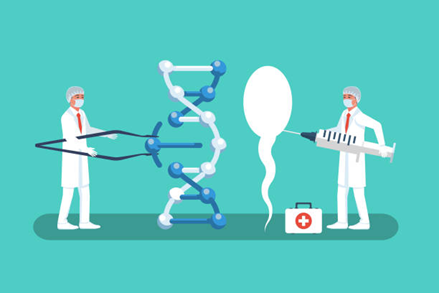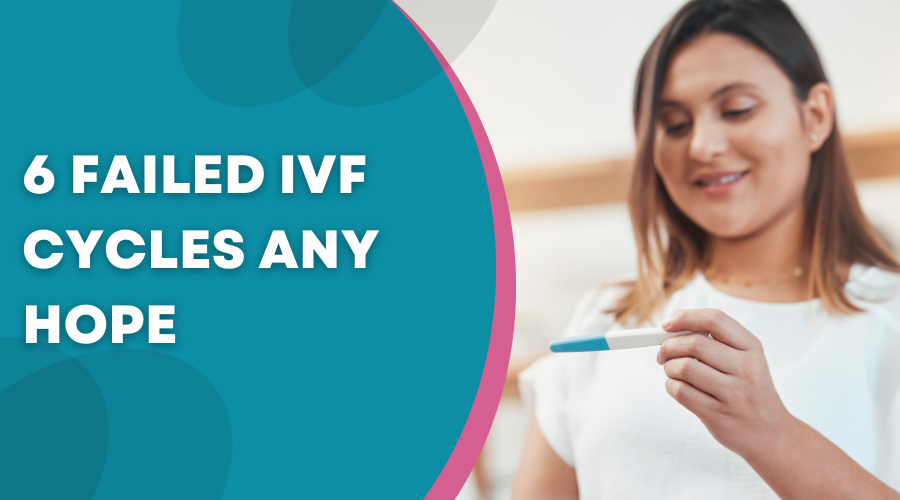Infertility is a challenging and deeply personal issue that affects millions of people worldwide. It can cast a shadow on dreams and create emotional turmoil. According to the World Health Organization, around 48 million couples and 186 million individuals live with infertility globally. Infertility doesn’t discriminate; it can affect anyone, regardless of age, ethnicity, or socioeconomic status.
In vitro fertilization (IVF) has emerged as a beacon of hope for many struggling with infertility. Dr. Nisarg Patel, a renowned fertility specialist at Nisha IVF Centre in Ahmedabad, emphasizes:
“IVF offers many couples a viable path to parenthood. It has revolutionized the treatment of infertility and has given hope to those who once thought they could never have a child. However, it’s important to acknowledge that IVF does not guarantee success. Even after as many as 6 attempts, IVF cycles can sometimes fail, leaving couples feeling disheartened.
Causes of 6 Failed IVF Cycles
 Several factors can contribute to repeated IVF failures. Understanding these causes can help in addressing and overcoming them:
Several factors can contribute to repeated IVF failures. Understanding these causes can help in addressing and overcoming them:
- Embryo Quality: Poor embryo quality is a common cause of IVF failure. Genetic abnormalities or chromosomal issues can prevent embryos from implanting or developing properly.
- Uterine Factors: Issues with the uterus, such as fibroids, polyps, endometriosis, or an abnormal uterine shape, can hinder embryo implantation.
- Egg Quality: As women age, the quality of their eggs declines, leading to a higher chance of chromosomal abnormalities and failed IVF cycles.
- Sperm Quality: Male factor infertility, including low sperm count, poor motility, or abnormal morphology, can also affect IVF outcomes.
- Immune System Issues: Sometimes, a woman’s immune system may mistakenly attack the embryo, preventing successful implantation.
- Lifestyle Factors: Smoking, excessive alcohol consumption, obesity, and high stress levels can negatively impact IVF success rates.
“Identifying the underlying causes of repeated IVF failures is crucial,” advises Dr. Patel, a seasoned fertility specialist in Ahmedabad. “It allows us to tailor a treatment plan that addresses these issues.”
Chances of Conceiving After 6 Failed IVF Cycles
 While multiple IVF failures can be discouraging, they don’t necessarily mean the end of the road. Statistics show that cumulative success rates can increase with each additional IVF cycle. For example, while a single cycle might offer a 30-40% success rate, this rate can rise significantly with multiple attempts.
While multiple IVF failures can be discouraging, they don’t necessarily mean the end of the road. Statistics show that cumulative success rates can increase with each additional IVF cycle. For example, while a single cycle might offer a 30-40% success rate, this rate can rise significantly with multiple attempts.
Dr. Patel, a sought-after doctor for IVF procedures in Ahmedabad, says:
“Success rates vary widely depending on individual circumstances, such as age, the cause of infertility, and previous treatment responses. Each couple’s journey is unique, and perseverance and the right medical guidance can still lead to a successful pregnancy.”
Treatment Options to Consider After 6 Failed IVF Cycles

After experiencing multiple IVF failures, exploring alternative or supplementary treatments might be necessary:
- Preimplantation Genetic Testing (PGT): PGT can help identify chromosomally normal embryos, increasing the chances of successful implantation and pregnancy.
- Donor Eggs or Sperm: Using donor eggs or sperm can be an option, especially if there are significant quality issues with the patient’s own gametes.
- Surrogacy: For women with uterine issues or recurrent implantation failure, surrogacy might be a viable path to parenthood.
- Immunotherapy: If the doctor suspects immune system issues, treatments to modulate the immune response may improve the chances of successful implantation.
- Lifestyle Modifications: Adopting a healthier lifestyle, including a balanced diet, regular exercise, and stress management, can improve fertility and IVF outcomes.
- Innovative Techniques: Exploring newer techniques, such as time-lapse embryo imaging or mitochondrial transfer, might offer additional hope.
How to Cope with 6 Failed IVF Cycles?
 Dealing with the emotional and physical toll of multiple IVF failures can be overwhelming. Here are some strategies to help cope:
Dealing with the emotional and physical toll of multiple IVF failures can be overwhelming. Here are some strategies to help cope:
- Seek Support: Joining a support group or connecting with others who have experienced similar challenges can provide comfort and understanding.
- Counseling: Professional counseling can help manage emotional stress and provide coping strategies for grief and disappointment.
- Open Communication: Maintaining open communication with your partner about your feelings and fears can strengthen your relationship and provide mutual support.
- Mindfulness and Relaxation: Practices such as yoga, meditation, and mindfulness can help reduce stress and improve overall well-being.
- Stay Informed: Keeping yourself informed about the latest advancements in fertility treatments can provide hope and new avenues to explore.
“Emotional resilience is key,” says fertility expert Dr. Patel. “While the journey can be tough, maintaining hope and seeking the right support can make a significant difference.”
Conclusion
Infertility can deeply affect an individual’s identity and self-esteem. The journey through IVF, especially with multiple failed cycles, can be heartbreaking. However, it’s essential to remember that each attempt brings new learning and possibilities.
“Hope is a powerful ally,” says Ahmedabad’s eminent IVF doctor, Dr. Nisarg Patel. “With the advancements in fertility treatments, there are still many avenues to explore even after several IVF failures. While the path may be challenging, the possibility of holding your baby in your arms one day makes it worth every effort.”


